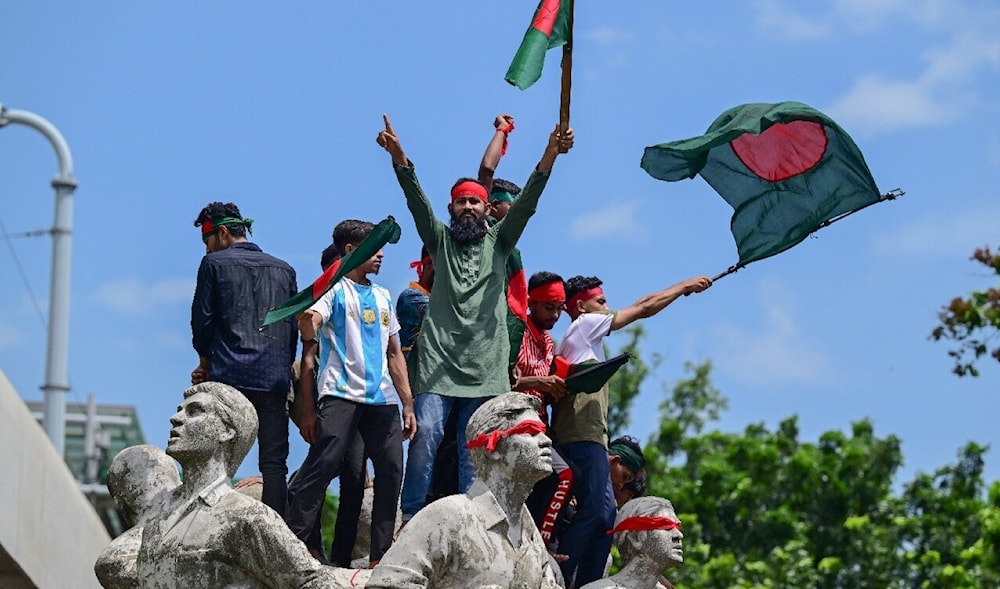Bangladesh army chief set to meet protest organizers after PM resigned
The student-led anti-quota protests have sparked nationwide violence and unrest, resulting in the killing of over 300 people since it began back in July.
-

Demonstrators perched on a monument waving Bangladeshi flags in Dhaka, August 4, 2024. (AFP)
Student organizers of the Bangladesh anti-quota protests are scheduled to meet Army Chief General Waker-Uz-Zaman following a military announcement that it would form an interim government after the resignation of Prime Minister Sheikh Hasina on Monday.
Waker-Uz-Zaman is expected to meet the demonstration organizers at 12 pm local time (0600 GMT) on Tuesday, the army said in a statement following the general's televised address on Monday announcing Hasina's resignation after she fled to India due to the nationwide protests demanding she step down after weeks of violent crackdowns on demonstrations, adding that an interim government would be formed.
The general said he held talks with major political party leaders, excluding the former prime minister's ruling party, the Awami League, to discuss future proceedings. He is also set to attend a meeting with Presiden Mohammed Shahabuddin, who announced that the transitional government will hold elections as soon as all parties and stakeholders have been consulted.
Awami League's opposition, Hasina's nemesis, and chairperson of the Bangladesh Nationalist Party (BNP) Begum Khaleda Zia will be cleared of "all charges legally and come out soon" after her conviction in 2018 in a graft case, a move that was "unanimously decided," Shahabuddin stated.
'We wouldn’t accept any army-supported or army-led government'
The organizers of the student demonstrations called for the formation of a new interim government under the guidance of Nobel peace laureate Muhammad Yunus, a video posted on Facebook revealed.
“Any government other than the one we recommended would not be accepted,” Nahid Islam, one of the main organizers of the student demonstration, said in a video with three other coordinators. “We wouldn’t accept any army-supported or army-led government.”
“We have also had discussions with Muhammad Yunus and he has agreed to take on this responsibility at our invitation,” Islam added.
Back in January, Yunus, along with three other people, was convicted of six months imprisonment for violating labor laws at Grameen Telecom, the non-profit company he founded in 1983. In June, Yunus told The Guardian he faced 20 years of pressure from the Bangladeshi government for his work that aimed to enhance the lives of millions of impoverished people, especially women.
Bangladesh PM Hasina resigns amid protests, leaves country
Bangladesh's Prime Minister Sheikh Hasina resigned and left the country on Monday after thousands of protesters entered her official residence amid ongoing violent student-led protests that have killed at least 300 people since July.
At least 93 people, including 14 police officers, were killed with over a thousand wounded on Sunday amid violent clashes between the police and anti-government demonstrators during nationwide protests demanding the resignation of the Prime Minister, marking one of the deadliest demonstrations since they ignited in July.
The nationwide protests took place in 20 districts on Sunday against the ruling party, with law enforcement firing tear gas and stun grenades to disband the tens of thousands of demonstrations demanding Hasina resign following weeks of violent student-led anti-quota protests.
At least 56 people were killed Monday during the ensuing violence, mainly in Dhaka but also in other cities, police said, saying gangs had launched revenge attacks on the PM's allies.
The latest violence took the total number of people killed since protests began in early July to at least 356, according to an AFP tally based on police, government officials, and doctors at hospitals.
Soldiers and police in several cases did not intervene to stem Sunday's protests, unlike during the past month of rallies that repeatedly ended in deadly crackdowns.

 4 Min Read
4 Min Read








